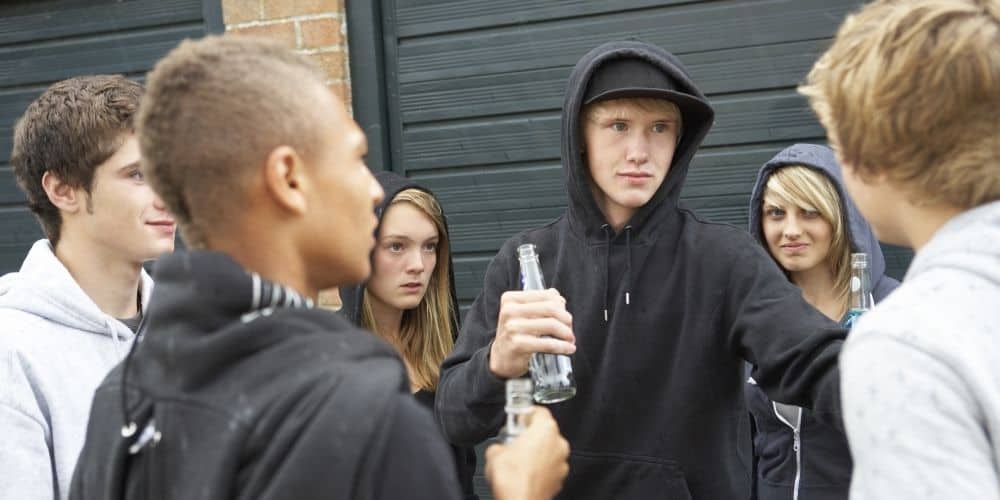
This website uses cookies to improve your experience. We'll assume you're ok with this, but you can opt-out if you wish. Read More
The Next Round: What happens after you change your drinking?

“How to talk to a teenager if they’re drinking alcohol” was first published on DRINKiQ.com.


How can you talk to a teenager about drinking? Will they listen? Will it end in a fight?
Are there any tactics to ensure a positive outcome?

Across societies, teenagers learn to drink like the adults around them. So as an adult, you have a responsibility to help the young people in your life develop a healthy and respectful relationship with alcohol.
Young people are naturally curious, so they may already have heard stories about drinking, even if they haven’t tried it. Educate yourself about alcohol and find opportunities to open the conversation calmly. Ask what they already know, answer their questions and build on their existing knowledge.
The success of your conversations depends on the strength of your relationship. So, whether you’re discussing alcohol or not, foster an atmosphere of openness and mutual respect. But what should you do if your teenager is already drinking?
If you’re waiting for a teenager to come home, it can be hard to control your feelings of frustration when they finally come through the door. But be realistic. An intoxicated teenager is not going to remember a conversation. Anger – yours and theirs – is a real possibility. So take a deep breath. There will be a time for talking, but not now.
If a young person is intoxicated, they need care rather than confrontation. Alcohol takes time to process, so if they’ve been binge drinking, keep a close eye on them. Know the symptoms of alcohol poisoning and seek medical help if they become unwell.
Otherwise, encourage them to drink plenty of water and get some sleep. They may feel hungover in the morning, so they’ll need your support. Put any anger and concern to one side for the moment and focus on their physical and emotional needs, as if they were sick for any other reason. There will be time to talk when they feel better.Just telling someone what to do rarely works as a behaviour change strategy, so you shouldn’t expect this approach to be effective.- Dru Jaeger
Drinking too fast stops the brain from forming memories, so if a young person is confused about what happened, or there are significant blanks in their account, be patient with them. Focus on what they can recall: where they were, who was there, what they drank and what happened. But most importantly, ask what they think they could do differently next time.
If you’re angry, it can be tempting to leap to prohibitions and punishments. But even if they’re under the legal drinking age, try to approach the conversation as if they were already an adult. Just telling someone what to do rarely works as a behaviour change strategy, so you shouldn’t expect this approach to be effective.
As adults, we change by reflecting on our past experiences and making new plans. Young people can do this too, and you can help them learn this life skill. This could be a valuable learning experience for them, but it relies on you guiding them as they come to their own conclusions.
If you’ve had difficulties with drinking, be straightforward about your experiences. You can avoid the charge of hypocrisy by being honest and showing them that you’re not perfect. In any case, they’ve probably worked out a lot more than you would ever admit to them.
Your experiences – good and bad – can be valuable to them. Of course, it’s possible in their eyes that you know nothing at all and you don’t understand what they’re going through. But this view will change with time, as you start moving towards an adult-to-adult relationship.
As you’re developing a more equal relationship, it’s OK to lay down rules and set boundaries. But be cautious about imposing restrictions that you’re unwilling to enforce, or that you’d not follow yourself. Telling a teenager to have one drink and be home by 10 pm won’t carry much weight, especially if you regularly drink more or stay out later. Whatever your personal history with alcohol, you can be a role model now. And it’s never too late to have a conversation about drinking – including your own.
Cheers

Dru Jaeger designs and leads Club Soda’s courses, and is the author of How to Be A Mindful Drinker. This article first appeared on DRINKiQ, where Dru has also written on subjects including how to talk to someone if you’re concerned about their drinking.
If you’ve got a question to Ask Dru, get in touch.
This website uses cookies to improve your experience. We'll assume you're ok with this, but you can opt-out if you wish. Read More
| Name | Domain | Purpose | Expiry | Type |
|---|---|---|---|---|
| wpl_user_preference | joinclubsoda.com | WP GDPR Cookie Consent Preferences. | 1 year | HTTP |
| PHPSESSID | www.tickettailor.com | PHP generic session cookie. | 55 years | HTTP |
| AWSALB | www.tickettailor.com | Amazon Web Services Load Balancer cookie. | 7 days | HTTP |
| YSC | youtube.com | YouTube session cookie. | 55 years | HTTP |
| Name | Domain | Purpose | Expiry | Type |
|---|---|---|---|---|
| VISITOR_INFO1_LIVE | youtube.com | YouTube cookie. | 6 months | HTTP |
| Name | Domain | Purpose | Expiry | Type |
|---|---|---|---|---|
| _ga | joinclubsoda.com | Google Universal Analytics long-time unique user tracking identifier. | 2 years | HTTP |
| sbjs_migrations | joinclubsoda.com | Sourcebuster tracking cookie | 55 years | HTTP |
| sbjs_current_add | joinclubsoda.com | Sourcebuster tracking cookie | 55 years | HTTP |
| sbjs_first_add | joinclubsoda.com | Sourcebuster tracking cookie | 55 years | HTTP |
| sbjs_current | joinclubsoda.com | Sourcebuster tracking cookie | 55 years | HTTP |
| sbjs_first | joinclubsoda.com | Sourcebuster tracking cookie | 55 years | HTTP |
| sbjs_udata | joinclubsoda.com | Sourcebuster tracking cookie | 55 years | HTTP |
| sbjs_session | joinclubsoda.com | SourceBuster Tracking session | Session | HTTP |
| Name | Domain | Purpose | Expiry | Type |
|---|---|---|---|---|
| mailchimp_landing_site | joinclubsoda.com | Mailchimp functional cookie | 28 days | HTTP |
| __cf_bm | tickettailor.com | Generic CloudFlare functional cookie. | Session | HTTP |
| NID | google.com | Google unique id for preferences. | 6 months | HTTP |
| Name | Domain | Purpose | Expiry | Type |
|---|---|---|---|---|
| _ga_10XZMT03ZM | joinclubsoda.com | --- | 2 years | --- |
| AWSALBCORS | www.tickettailor.com | --- | 7 days | --- |
| cf_clearance | tickettailor.com | --- | 1 year | --- |
| VISITOR_PRIVACY_METADATA | youtube.com | --- | 6 months | --- |
Join Club Soda for 10% off your first order of drinks for UK delivery. Plus get our latest news and special offers for members to choose better drinks, change your drinking and connect with others.
If you get an error message with this form, you can also sign up at eepurl.com/dl5hPn